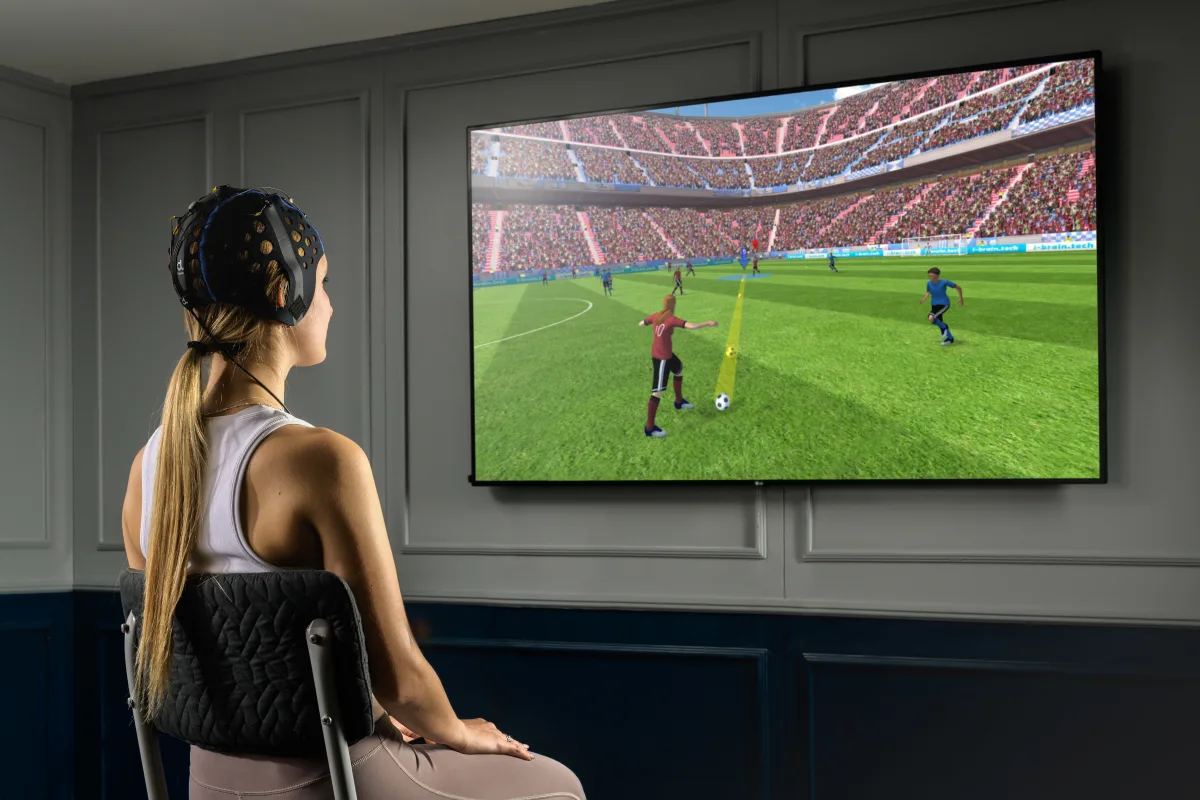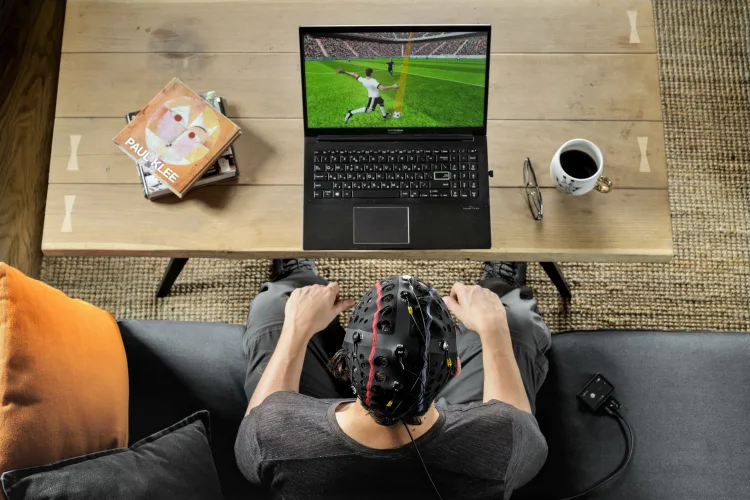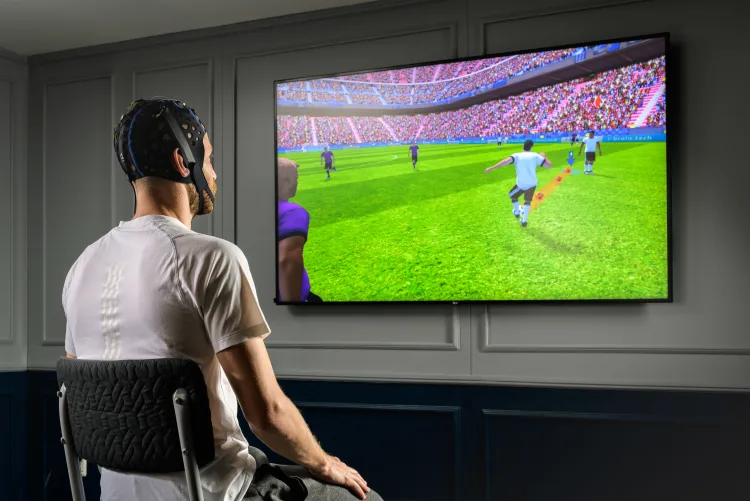'Training the brain' - The next evolution of the modern football star

I enter i-BrainTech’s shared meeting space in London with excitement, and also trepidation.
I had heard so much about the development of their cognitive technology but now I was going to see for myself what the elite sports teams and athletes already utilising the product were experiencing.
i-BrainTech’s vision is bold, but has clarity; if athletes spend so long training their bodies, why shouldn’t they train their brains, too?
It’s a rudimentary description of what could prove to not only be truly special, but have the ability to change the lives not only of sportspeople but, with the right touchpoints, humans suffering from any number of afflictions.
They have conducted a pilot programme with the Portugal national team, worked with Maccabi Tel Aviv in Israel and have an ongoing demonstration with Atlanta United in MLS. The feedback from players has been virtually unanimously positive. But what exactly are they doing, and how is it helping?

Dr. Konstantin Sonkin is the neuroscientist who founded i-BrainTech in 2019, and is on hand to explain how this works.
He tells FootballTransfers: “Our training system utilises the power of neurofeedback to effectively train the brain regions responsible for concentration and motor control. By using an EEG (skull) cap, we are able to observe players’ brain activity while engaging in visualisation tasks.
“Our system carefully evaluates this brain activity and provides positive feedback only when the desired patterns are detected. This real-time feedback leads to physical changes in the brain, known as brain plasticity, resulting in improved abilities to plan and execute movements, along with enhanced cognitive functions and, as a result, physical performance.
“To assess the impact of our system, we conduct on-field performance tests both before and after consistent training. This allows us to demonstrate notable improvements in kick accuracy on the field. Additionally, we analyse brain data from these targeted regions to measure and quantify the cognitive development of players. This data-driven approach ensures a comprehensive understanding of players’ progress and optimises the training process.”
Back in the shared meeting space, I’m greeted by Adam Codron, UK Partner for i-BrainTech, and we spend time talking about football. I don the EEG cap and Adam applies a gel to the sensors - six of them in total - that will be able to read my brainwaves. With it in place, I’m synced up with a laptop in front of me and I perform some basic actions; I blink and, sure enough, the waves flicker - the messages from my brain are being recognised on-screen.
I then watch a drone shot above a football pitch for two minutes as players move around, then I close my eyes for another two minutes. I’m ready, and the test can begin.
There are different training programs per position, as each position requires a different set of skills. Considering myself to be a forward (only in my head!) I choose that and settle in. Adam explains that all I need to do is think about kicking the ball with either my right or left foot when prompted, and then think about where I want to kick it in the goal.
This is immediately disconcerting. Kicking a ball is such an automatic motion that being asked to think about doing it, to visualise it, is at first difficult. The power bar doesn’t load, and my avatar falls over.
But then I quickly find my rhythm. I’m visualising my right foot kicking through a football while remaining perfectly still, and my avatar responds. I’m able to aim it to where it needs to go to find the net, too. As it turns out, I’m pretty good at this, Adam advises.
He increases the difficulty, challenging me to activate my brain to a higher level. I’m at teenage academy level now and I can still think quickly enough - just. But I struggle more with the accuracy element than the power. The test also moves between my strong foot (right) and my weak (left) and my results also reflect that difference.

On this part of the test, founder Sonkin adds something which is genuinely fascinating: “Let's take the example of the weak foot and strong foot in sports.
“When we are born, both legs have similar muscle sizes. However, through repetitive training and practice, the brain learns to activate and coordinate the muscles of one leg more effectively, making it stronger and more dominant. This is why our right leg might be considered our 'strong leg' while the left leg is perceived as the 'weak leg'.
“By using the i-Brain neurofeedback system, we achieve the repetition and feedback required to enhance this mind muscle connection. Over time, the brain physically rewires itself, forming new connections that strengthen our control over both legs.”
I’ve completed my training and the overriding feeling is clear - I’m desperate to now kick an actual ball into an actual net. Adam confirms that this is very normal, and I can see that, above everything else, using this product can be motivational in respect of improving your ability.
I can also understand how people may be unable to grasp exactly how simply thinking about kicking a football can transpose itself into a tangible improvement on the pitch. Again, Sonkin makes it clear that regular application with this technology can fundamentally change how a player prepares.
He added: “[Firstly] It enables injured players to perform thousands of repetitions of position-specific football drills with no load on the body. This promotes neuromuscular activity and enhances motor skills through motor imagery, which has been proven crucial for a successful return to play.
“Healthy players [also] benefit from our system by receiving an additional training stimulus that extends training time. Through consistent utilisation, the technology significantly enhances key football actions on the field. It facilitates mental rehearsal, enabling players to familiarise themselves with team strategies and effectively acquire the team's system of play.
“The training program [also] proves particularly beneficial for youth players, leveraging their highly adaptable and responsive brains. Sports practitioners gain access to unique brain data, enabling them to measure and track players' cognitive abilities, monitor their progress, and customise training programs to address individual needs.”
Cliches have always been around, such as players being ‘a second quicker in their head’, or how they can ‘paint the picture in their mind’. In the case of i-BrainTech it’s almost precisely what can be done.
Adam is absolutely keen to stress, and Sonkin would agree, that the technology can’t improve bad technique - that’s absolutely not what this is for. But in the margins at the highest level, where the ball is shifted around quicker than ever and where a second in the past is a fraction of a second now, being able to move quicker, react sharper, has never been more prevalent.
But this definitely isn’t just about sport. The applications extend way beyond that and, as an individual who has suffered from anxiety in the past, it’s an exciting development.
Sonkin adds: “Our technology’s unique capability to directly train, enhance, and measure motor control and concentration makes it a natural fit for expansion into the domains of education and rehabilitation.
“Schools are actively seeking cognitive training solutions that harness brain data to inform instructional strategies and interventions.
“In addition, neurofeedback has demonstrated its effectiveness in promoting neuromuscular activity and improving motor skills. This breakthrough has profound implications for individuals with motor-related injuries, offering them an opportunity to regain motor control without subjecting their bodies to physical strain.”
It’s been clear for some time that humans, let alone footballers, haven’t given enough due time and care to their mental health, but also the potential of the brain itself. For i-BrainTech, it starts in sports, but eventually, it could be to help make all of us better.






















